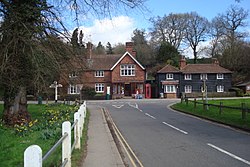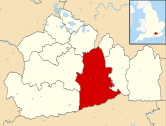Abinger Hammer: Difference between revisions
Removed the reference to Drakes on the Pond Michelin restaurant. The restaurant has not operated for some years. I can't remember what year it ceased. |
Rescuing 2 sources and tagging 0 as dead. #IABot (v1.2.4) |
||
| Line 21: | Line 21: | ||
'''Abinger Hammer''' is a village situated on the [[A25 road|A25]] between [[Dorking]] and [[Guildford]] in [[Surrey]], England. It lies within the parish of [[Abinger]] which includes [[Abinger Common]] and [[Sutton Abinger]]. Other neighbouring villages are [[Wotton, Surrey|Wotton]] and [[Gomshall]]. |
'''Abinger Hammer''' is a village situated on the [[A25 road|A25]] between [[Dorking]] and [[Guildford]] in [[Surrey]], England. It lies within the parish of [[Abinger]] which includes [[Abinger Common]] and [[Sutton Abinger]]. Other neighbouring villages are [[Wotton, Surrey|Wotton]] and [[Gomshall]]. |
||
[[Image:abingerclock.jpg|150px|thumb|left|Abinger Hammer Clock]] |
[[Image:abingerclock.jpg|150px|thumb|left|Abinger Hammer Clock]] |
||
The clock which overhangs the main road portrays the figure of "Jack the Blacksmith", who strikes the hour with his hammer. The clock bears the motto "By me you know how fast to go". The clock was given in memory of the first Lord Farrer of Abinger Hall who died in 1899. The clock represents the iron industry and the role played by the county of Surrey in the industrial past.<ref>[http://www.ukattraction.com/south-east-england/abinger-hammer-village-clock.htm UK attractions] retrieved 6-1-07</ref> |
The clock which overhangs the main road portrays the figure of "Jack the Blacksmith", who strikes the hour with his hammer. The clock bears the motto "By me you know how fast to go". The clock was given in memory of the first Lord Farrer of Abinger Hall who died in 1899. The clock represents the iron industry and the role played by the county of Surrey in the industrial past.<ref>[http://www.ukattraction.com/south-east-england/abinger-hammer-village-clock.htm UK attractions] {{wayback|url=http://www.ukattraction.com/south-east-england/abinger-hammer-village-clock.htm |date=20061231022529 }} retrieved 6-1-07</ref> |
||
The [[River Tillingbourne]] flows through the village where it was impounded in the 16th century into a hammer pond, providing water power for Abinger Forge which worked Sussex sourced iron.<ref>Pearce, H, ''Hammer and Furnace Ponds'', Pomegranate Press, 2011</ref> It has long since been adapted to grow watercress.<ref>http://www.hammerpond.org.uk/Gazetteer/Surrey/surrey.htm</ref> Brown trout swim in the stream, which is their natural habitat; the occasional larger [[rainbow trout]] can be sighted. These may have escaped from the fish farm further downstream towards Gomshall. T |
The [[River Tillingbourne]] flows through the village where it was impounded in the 16th century into a hammer pond, providing water power for Abinger Forge which worked Sussex sourced iron.<ref>Pearce, H, ''Hammer and Furnace Ponds'', Pomegranate Press, 2011</ref> It has long since been adapted to grow watercress.<ref>http://www.hammerpond.org.uk/Gazetteer/Surrey/surrey.htm</ref> Brown trout swim in the stream, which is their natural habitat; the occasional larger [[rainbow trout]] can be sighted. These may have escaped from the fish farm further downstream towards Gomshall. T |
||
| Line 31: | Line 31: | ||
Abinger Hammer village school was a state school but after the LEA closed it in 1982, the local community took over the running of it. As of 2008 the school had only sixteen students. A small group of trustees worked to raise funds to maintain the building and to pay the staff. The number of students has since reduced until the school was forced to close in July 2009.<ref>[http://www.education.gov.uk/edubase/establishment/general.xhtml?urn=125430 Department for Education website] retrieved 25-2-15</ref> |
Abinger Hammer village school was a state school but after the LEA closed it in 1982, the local community took over the running of it. As of 2008 the school had only sixteen students. A small group of trustees worked to raise funds to maintain the building and to pay the staff. The number of students has since reduced until the school was forced to close in July 2009.<ref>[http://www.education.gov.uk/edubase/establishment/general.xhtml?urn=125430 Department for Education website] retrieved 25-2-15</ref> |
||
During the years 1925 to 1945, the novelist [[E. M. Forster]] lived with his mother Alice Clare (Lily) in West Hackhurst, Abinger Hammer in a house designed by his father, the architect 'Eddie' Morgan, and previously occupied by his aunt Laura.<ref>[https:// |
During the years 1925 to 1945, the novelist [[E. M. Forster]] lived with his mother Alice Clare (Lily) in West Hackhurst, Abinger Hammer in a house designed by his father, the architect 'Eddie' Morgan, and previously occupied by his aunt Laura.<ref>[https://www.heureka.clara.net/surrey-hants/surrey-writers.htm] {{wayback|url=https://www.heureka.clara.net/surrey-hants/surrey-writers.htm |date=20160304024259 }}</ref> Forster was obliged to leave this home in 1946 as the landlord refused to renew the lease.<ref>Furbank, P. N. ''E. M. Forster, A Life.'' vol 2. London: Secker and Warburg, 1978.</ref> |
||
[[Edward Wilkins Waite]] (1854–1924), landscape painter, lived for a time at Abinger Hammer. He was born in [[Leatherhead]], Surrey, and much of his work depicted rural scenes in the county - including at least one painting done in the vicinity of the village (see "[[commons:File:Edward Wilkins Waite03.jpg|Old Willows]]"). |
[[Edward Wilkins Waite]] (1854–1924), landscape painter, lived for a time at Abinger Hammer. He was born in [[Leatherhead]], Surrey, and much of his work depicted rural scenes in the county - including at least one painting done in the vicinity of the village (see "[[commons:File:Edward Wilkins Waite03.jpg|Old Willows]]"). |
||
Revision as of 19:18, 2 October 2016
| Abinger Hammer | |
|---|---|
 Abinger Hammer general store | |
| OS grid reference | TQ095475 |
| District | |
| Shire county | |
| Region | |
| Country | England |
| Sovereign state | United Kingdom |
| Post town | Dorking |
| Postcode district | RH5 |
| Dialling code | 01306 |
| Police | Surrey |
| Fire | Surrey |
| Ambulance | South East Coast |
| UK Parliament | |
Abinger Hammer is a village situated on the A25 between Dorking and Guildford in Surrey, England. It lies within the parish of Abinger which includes Abinger Common and Sutton Abinger. Other neighbouring villages are Wotton and Gomshall.

The clock which overhangs the main road portrays the figure of "Jack the Blacksmith", who strikes the hour with his hammer. The clock bears the motto "By me you know how fast to go". The clock was given in memory of the first Lord Farrer of Abinger Hall who died in 1899. The clock represents the iron industry and the role played by the county of Surrey in the industrial past.[1]
The River Tillingbourne flows through the village where it was impounded in the 16th century into a hammer pond, providing water power for Abinger Forge which worked Sussex sourced iron.[2] It has long since been adapted to grow watercress.[3] Brown trout swim in the stream, which is their natural habitat; the occasional larger rainbow trout can be sighted. These may have escaped from the fish farm further downstream towards Gomshall. T

In summer the village green in Abinger is popular with locals and tourists who like to picnic on the grass whilst watching a game of cricket in surroundings which are quintessentially English. The cricket pitch borders the Tillingbourne - the Post Office sells nets for children to "fish" in this shallow and sandy stream. Annie's tearoom is next to the Post Office and offers lunches and teas seven days a week.

Abinger Hammer village school was a state school but after the LEA closed it in 1982, the local community took over the running of it. As of 2008 the school had only sixteen students. A small group of trustees worked to raise funds to maintain the building and to pay the staff. The number of students has since reduced until the school was forced to close in July 2009.[4]
During the years 1925 to 1945, the novelist E. M. Forster lived with his mother Alice Clare (Lily) in West Hackhurst, Abinger Hammer in a house designed by his father, the architect 'Eddie' Morgan, and previously occupied by his aunt Laura.[5] Forster was obliged to leave this home in 1946 as the landlord refused to renew the lease.[6]
Edward Wilkins Waite (1854–1924), landscape painter, lived for a time at Abinger Hammer. He was born in Leatherhead, Surrey, and much of his work depicted rural scenes in the county - including at least one painting done in the vicinity of the village (see "Old Willows").
Oxmoor Copse, an Area of Outstanding Natural Beauty lies to the south of the village.
References
- ^ UK attractions Archived 2006-12-31 at the Wayback Machine retrieved 6-1-07
- ^ Pearce, H, Hammer and Furnace Ponds, Pomegranate Press, 2011
- ^ http://www.hammerpond.org.uk/Gazetteer/Surrey/surrey.htm
- ^ Department for Education website retrieved 25-2-15
- ^ [1] Archived 2016-03-04 at the Wayback Machine
- ^ Furbank, P. N. E. M. Forster, A Life. vol 2. London: Secker and Warburg, 1978.
External links
![]() Media related to Abinger Hammer at Wikimedia Commons
Media related to Abinger Hammer at Wikimedia Commons

